M2 U1 Grammar
高一英语模块二第一单元语法m2u1grammar

• (重庆卷24). The book has been translated into thirty languages since it C on the market in 1973. • A. had come B. has come • C. came D. comes
Focus Two
一般过去时与现在完成时 一般过去时: 过去事实(过去发生的,和现 在没有联系的动作或状态)
My cousin went to Canada two years ago. I worked as a teacher for three years, and now I am a lawyer.
现在完成时:表示过去发生的事对现在的影响 或过去开始的动作一直延续到现在
unhappy now
2.过去开始的动作一直延续到现在 I didn’t see Justin last Friday night.
I don’t see Justin at present.
● last Friday night
● present
I haven’t seen Justin since last Friday night.
构成
have/has (not)+过去分词
概念 1.表示过去发生的事对现在的影响
2.过去开始的动作一直延续到现在
1.表示过去发生的事对现在的影响
• The disappearance of Justin has made Kelly very unhappy.
disappearance in the past
Present perfect continuous tense
观察思考:书上句子
Book 2 Unit 1 Grammar限制性和非限制性定语从句

归纳三: 先行词 。 1.限制性定语从句的关系词只指代________ 2.非限制性定语从句关系词既可指代 先行词 ,也可指代 _________ 整个主句 。 ________
练一练: (1) This letter is from her parents, who are working in Tibet.) (_______ (2) His mother, ( _________ whom he loved very much, ) died in 2011. (3) Football, ( _________ which is a very interesting game,)is played all over the world. (4) Mr. King, ( _________ whose legs were badly hurt, )was quickly sent to hospital. (5) The Chinese will never forget October 1st, 1949, ( ________ when the PRC was founded.) /on which
(非限制性定语从句)
限制性定语从句
人 物/时/地/原
主语
who, that which, that 宾语 who, whom, which, that, that, ~ ~ 定语 whose 时间: 状语 when 地点: = 介词+which where 原因: why = for which
3) Mr. Wang who/that is my former teacher retired last year. Mr. Wang, who is my former teacher, retired last year. 4) The house which/that has a swimming pool is very expensive. The house, which has a swimming pool, is very expensive. 5) Students admire (钦佩) the professor a lot (whom/who/that) you are talking about. Students admire(钦佩) the professor a lot, whom you are talking about. 6) This novel (which/that) I have read three times is very touching. This novel, which I have read three times, is very touching.
M2U1 grammar(教师版) 2

Module 2 Unit 1 Tales of the unexplained Period 3 GrammarPresent perfect tense&Present perfect continuous tense【学习目标】 1.掌握现在完成时和现在完成进行时的用法。
2.区分现在完成时和一般过去时及现在完成时和现在完成进行时。
【知识线索】 现在完成时是一种既涉及过去又联系现在的时态。
现在完成进行时是动作开始于过去,持续到现在,有可能还会延续下去的时态。
1.He has lived in Beijing for ten years.2.I have already seen the film.3.He has been learning English for 6 years.4.I have been looking for you everywhere.【知识构建】现在完成时:1.现在完成时的构成:肯定句_________________否定句______________ 疑问句______________主语( I/We/You/They) + ______ +过去分词主语(He/She/It) + _______ +过去分词Keys: have/has +过去分词;have/has + not +过去分词;Have/Has +主语+过去分词......?;have; has2.现在完成时的用法:⑴ The boy _ _ (catch) a bird. He is very happy. has caught(2) Jack _________ (see) the concert. He doesn ’t want to see it again. has seen牛津高中英语模块二第一单元课时目标呈现新知导学课中师生互动课前自主预习(3) She ____ just _______ (come) back from the USA. has come(4) I _____ never ______ (visit) San Francisco in the USA. have visited总结:现在完成时: 表示发生在过去的事情对现在产生的影响(说话者强调过去的事情对现在产生的影响)或说话时刚刚完成的动作。
M2U1Grammar导学案

M2U1 Grammar and usagePresent perfect tense【学习目标】1.掌握现在完成时的用法。
2用于现在完成时的常见句型。
3.现在完成时和一般过去时的区别Pre-study (the structure)1. I have already seen the film.2. She has found her pen.3. The dirty clothes have been washed.现在完成时的构成:主动形式: ____________________________________被动形式: ____________________________________肯定句: He has cleaned his room .→否定句: ___________________________________→疑问句: ___________________________________Yes, ____________ / No, ____________肯定句:They have built a new bridge.→被动: ___________________________________________→否定句:________________________________________→疑问句:________________________________________Yes, ______________ /No, ____________Cooperation 合作学习现在完成时的用法 (Usages):用法1 【观察体验】1 It’s so dark. Someone has already turned off the light.过去的动作:_______________________对现在的影响:______________________2. Has he finished his homework yet?No, he hasn’t finished it yet. He is not free.3. I am full now. I have just had breakfast.4. I have never seen him.5. They have seen the novel before.6. She has ever been to Shanghai.【归纳】:表示过去发生或已经完成的某一动作对现在造成的______________。
高一英语M2 U1 Grammar2课件牛津英语_必修2

She _h_a_s_v_i_s_it_e_d_ (visit) Japan twice this month.
He _h_a_s__b_e_e_n__to_u_r_i_n_g(tour) America for two months.
Note: The present perfect continuous tense can’t be used with time expressions such as twice or how many times, because in this tense the action is continuous, not stopped and started again. We can use the present perfect tense for repeated actions, and the present perfect continuous tense for non-stop actions.
present perfect
_________________________________________
past perfect past
now future
present perfect continuous
_________________________________________
Summary 1:
1.We use the present perfect continuous tense to talk about actions that started in the past and are still continuing.
I have not been sleeping well since I returned home.
M2U1 Grammar 1牛津英语模块2语法
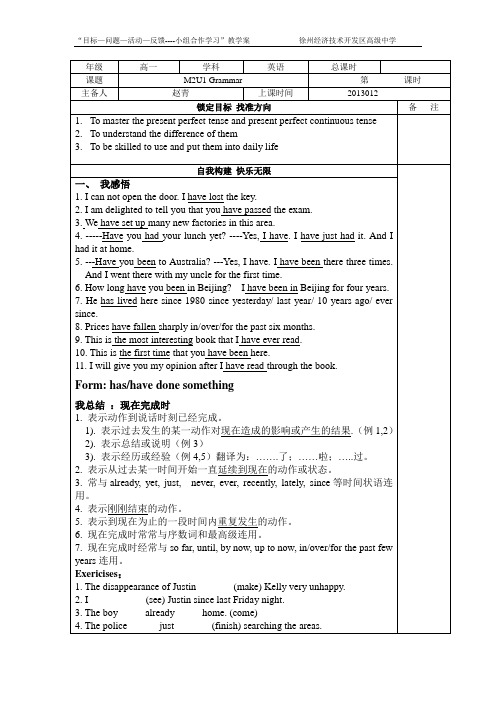
3.The farmers started working in the field an hour ago, and they are still working now,and may continue.Theyhave been workingin the field for an hour.
6.现在完成时常常与序数词和最高级连用。
7.现在完成时经常与so far, until, by now, up to now, in/over/for the past few years连用。
Exericises:
1.The disappearance of Justin_______(make)Kelly very unhappy.
8. Priceshave fallensharply in/over/for the past six months.
9. This isthe most interestingbook thatIhave ever read.
10.Thisisthe first timethat youhave beenhere.
6. How longhaveyoubeeninBeijing?Ihave been inBeijingfor four years.
7. Hehas livedhere since 1980 since yesterday/ last year/ 10 years ago/ ever since.
3).表示经历或经验(例4,5)翻译为:…….了;……啦;…..过。
2.表示从过去某一时间开始一直延续到现在的动作或状态。
高中英语 M2U1grammar and usage导学案

M2U1 Grammar and usage 导学案I现在完成时(present perfect tense)构成:__________________________________1.表示过去发生的某一动作对现在造成的影响或结果。
常和already, ever, for, just, lately, never, recently, yet等副词连用。
Eg: 1) I __________ my supper yet. (have not )2)Daniel _______ (live) in Beijing since he came to China.2.表示过去已经开始,持续到现在的动作或状态,也许还会持续下去。
常与段的时间连用如:for+一段时间,since+过去时间点,since+段时间+ago,since+从句,in/over/during +the past/last+一段时间,so far, up to now, until now,等。
•I __________(teach) in this school for 5 years.•H is father _________ (work)in that factory since1991.•T he Greens ________(live) in Beijing since 2 years ago.3.表示从过去到现在反复发生的动作的次数或所做过的工作量的积累。
1).This year alone we ______________ ten thousand trees. (plant)2).-How many pages of the book _______________? (read)-I __________ thirty-five pages. (read)4.用在“It (This) is / will be the first/ second … time +that”从句中,从句的谓语动词用现在完成时。
牛津英语M2U1grammar and usage

Key words
yet
already
ever
never
since
since 后面带过去时间或有一般过去时的句子
has worked Tom ___________ in the factory since he left school ten years ago. (work )
Key words
※短暂性动词与 延续动词间的转 换
瞬间性动词 buy borrow come go/leave open/close begin/start end/finish die catch a cold become interested in get married
延续性动词 5.短暂动词和
have keep
有already的句子在时态上并不都是现 在完成时. Eg. She’s already eighty years old. It was already very late.
Key words
yet
already
ever
never
注意: ever 曾经
用于疑问句中
never 从不 带有否定意义
Have been A: _______ you ever _______ to the park? ( be )
E.g. He has learned English since 2001.
I have seen the film.
3.现在完成时的常用时间状语
What are the key words for the Present Perfect Tense?
Key words
yet
already
注意:already 用于肯定句,
M2 U1 Grammar and usage

Exercise: complete the following sentences with the proper tense: have studied (1) We ____________(study) English for about five years. (2) They have lived __________(live ) in the south since their daughter was born. have read (3) I __________(read) your article three times. It‟s well written. has finished (4) The student ______________ (finish) her homework already. (5) Eric _____ just _____ (go) back to his hometown. has gone
Байду номын сангаас
• 否定句: 主语+助动词have/has+not+过去分词+其 他 • 现在完成时构成否定句时,只需在助动词have/has后 面加not就行。缩略式分别为haven„t ,hasn‟t。 • 另外,肯定句中有some,already时,改为否定时要分 别改成any,yet。 • 例如: 1)I haven't finished my homework yet.我还没有 完成我的作业。 2) I have never seen him before.以前我从来没有 见过他。 注:有时not可以用never代替,表示“从来没有”的 意思。
• 但是,瞬间动词完成时的否定式可与表示 一段时间的状语连用,表示一种状态。例 如: • I haven‟t received a letter from my father for two months. • 我已两个月没收到我爸爸的信了。 • He hasn‟t come here for a week. • 他一个星期没有来这里了。
牛津版教学设计 M2 U1 Grammar学案设计
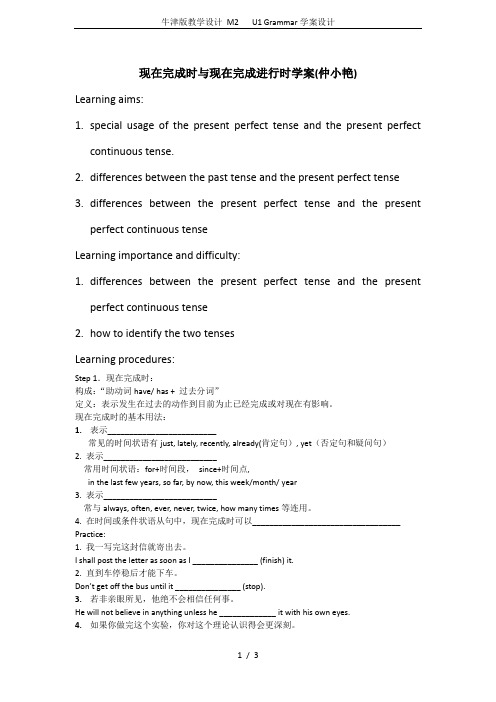
现在完成时与现在完成进行时学案(仲小艳)Learning aims:1.special usage of the present perfect tense and the present perfectcontinuous tense.2.differences between the past tense and the present perfect tense3.differences between the present perfect tense and the presentperfect continuous tenseLearning importance and difficulty:1.differences between the present perfect tense and the presentperfect continuous tense2.how to identify the two tensesLearning procedures:Step 1.现在完成时:构成:“助动词have/ has + 过去分词”定义:表示发生在过去的动作到目前为止已经完成或对现在有影响。
现在完成时的基本用法:1.表示_________________________常见的时间状语有just, lately, recently, already(肯定句), yet(否定句和疑问句)2. 表示__________________________常用时间状语:for+时间段,since+时间点,in the last few years, so far, by now, this week/month/ year3. 表示__________________________常与always, often, ever, never, twice, how many times等连用。
M2U1 Grammar and usage教案

Unit 1 Grammar and usagePresent perfect tenseI. Teaching aimIn this part, students are required to master the structure of present perfect tense and its usage. II. Teaching important pointsThe structure of present perfect tense and its three usages.III.Teaching important pointsi. The difference between present perfect tense and past tense.ii. The difference between for and since.iii. Some fixed sentences that are used in present perfect tense .IV. Teaching proceduresStep I Self-study(the structure)1.I have cleaned my bedroom.2.He hasn’t finished his homework..3.Have you read this novel ? Yes, I have. / No, I haven’t.4.We have studied English for 7 years.5.They haven’t seen each other since 1998.【总结归纳】现在完成时的基本句型:肯定式___________________________________否定式___________________________________疑问式___________________________________Step II Cooperation(The usages)Usage 1(用法1)•We ___________________(already open) the window.过去的动作: we opened the window.对现在的影响: The window is open•The boys are tired. They ________________ (just play) a ball game.过去的动作: The boys played a ball game.对现在的影响: The boys are tired.【总结归纳】:现在完成时用法1—已完成、影响性用法1.现在完成时表示动作开始于过去,结束于过去,但对现在仍有影响或造成结果。
M2 Unit 1 Grammar

PAGE 1 2. This gift was the Amber Room, which was given this name because … to make it .
PAGE 1 3. The amber which was selected had a beautiful yellow-brown color like honey.
9. Xi’an, whose walls remain as good as before, is one of the few cities with city walls.
10. Shanxi Province is a place with many cultural relics that / which are well looked after.
7. I remember the soldier that / who told me not to tell anyone what I had seen.
8. The soldiers moved the boxes to a mine where / in which they wanted to hide them.
PAGE 1 5. It was also a treasure decorated with gold and jewels , which took the country’s best artists about ten years to make.
PAGE 2 8. The next king of Prussia, Frederick I, to whom the amber room belonged, decided not to keep it.
译林牛津版高中英语M2 U1 Grammar and usage 教学课件 (共20张PPT)
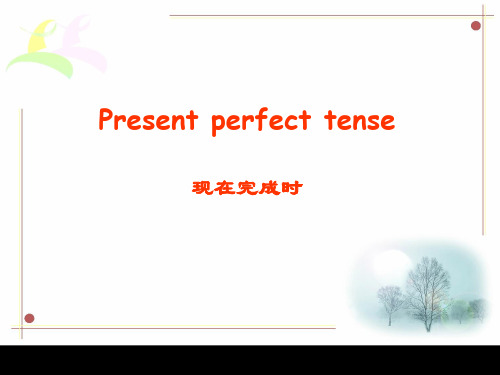
3.现在完成时的基本用法
用法一: “完成用法”
❖ 强调过去发生的动作对现在造成的影响或结 果.
❖ 常用状语有:already, yet, never, ever, just, before ...
e.g. -- Are you free? --I have just finished my homework. I am free.
2.强调这个动作对现在造成的影响或
产生的结果.
过去分词的构成
(P78-79)
❖ 一类为规则动词,另一类为不规则动词。 ❖ 规则动词的变化为其一般过去时,而不规则
动词的变化有特定的形式,只能一一记忆。
E.g. break, write , know
❖ break – broke – broken ❖ write- wrote-written ❖ know- knew-known
in the past 5 years. have been built
4. 短暂性动词与延续性动词
短暂性动词: 表示短暂的运动状态(瞬间完成或延续时间很短的
动词). (e.g. start, begin, come, go, leave, arrive, die ...)
延续性动词: 表示持续的行为或状态的动词,能和表示一段时间的
3). They haven’t completed it yet.
4). A friend’s told me about a nice fish restaurant.
❖1.构成: have\has + done\been(过去
分词)
❖2.含义:
1.表示从过去开始一直持续到现在的 动作,这个动作已经完成;
4. have/has gone to have/has been to have/has been in
《M2U1 grammar 》
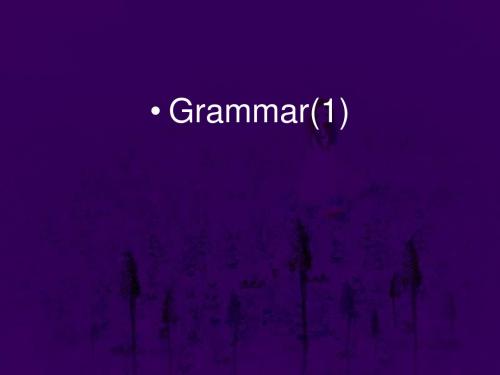
4. It has happened to me! 5. When asked …, who
has taken
charge
of the case, told …
6. So, while we have not dismissed the idea, we are looking into other possibilities as
Decide the sentences are true or false. I've left Shanghai for three days. I've been away from Shanghai for three days. I left Shanghai three days ago. It is /has been three days since I left Shanghai.
well.
4. It has happened to me! 5. When asked …, who charge
of the case, told …
6. So, while we the idea,
we are looking into other possibilities as
well.
4. It has happened to me! 5. When asked …, who
has taken
charge
of the case, told …
6. So, while we the idea,
we are looking into other possibilities as
well.
3. I
Revision. 1.Police in America have stepped up their
牛津译林版高中英语M2unit1 grammar 配套练习题
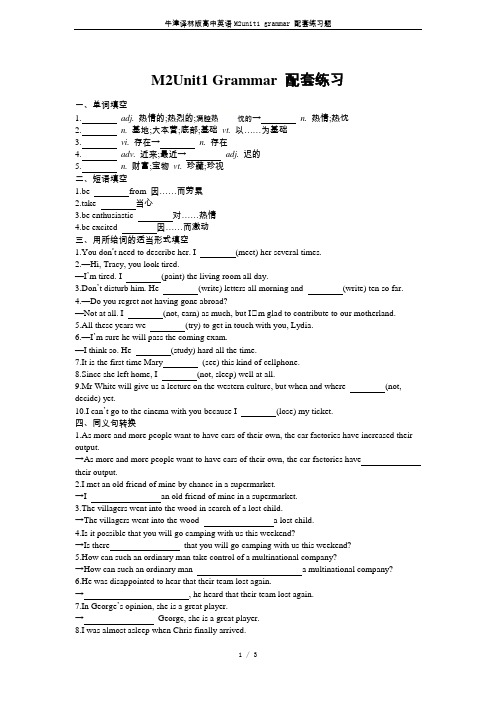
M2Unit1 Grammar 配套练习一、单词填空1.adj.热情的;热烈的;满腔热忱的→n.热情;热忱2.n.基地;大本营;底部;基础vt.以……为基础3.vi.存在→n.存在4.adv.近来;最近→adj.迟的5.n.财富;宝物vt.珍藏;珍视二、短语填空1.be from 因……而劳累2.take 当心3.be enthusiastic 对……热情4.be excited 因……而激动三、用所给词的适当形式填空1.You don’t need to describe her. I (meet) her several times.2.—Hi, Tracy, you look tired.—I’m tired. I (paint) the living room all day.3.Don’t disturb him. He (write) letters all morning and (write) ten so far.4.—Do you regret not having gone abroad?—Not at all. I (not, earn) as much, but I m glad to contribute to our motherland.5.All these years we (try) to get in touch with you, Lydia.6.—I’m sure he will pass the coming exam.—I think so. He (study) hard all the time.7.It is the first time Mary(see) this kind of cellphone.8.Since she left home, I (not, sleep) well at all.9.Mr White will give us a lecture on the western culture, but when and where (not, decide) yet.10.I can’t go to the cinema with you because I (lose) my ticket.四、同义句转换1.As more and more people want to have cars of their own, the car factories have increased their output.→As more and more people want to have cars of their own, the car factories havetheir output.2.I met an old friend of mine by chance in a supermarket.→I an old friend of mine in a supermarket.3.The villagers went into the wood in search of a lost child.→The villagers went into the wood a lost child.4.Is it possible that you will go camping with us this weekend?→Is there that you will go camping with us this weekend?5.How can such an ordinary man take control of a multinational company?→How can such an ordinary man a multinational company?6.He was disappointed to hear that their team lost again.→, he heard that their team lost again.7.In George’s opinion, she is a great player.→George, she is a great player.8.I was almost asleep when Chris finally arrived.→I was almost asleep when Chris finally .9.Scientists have many theories about how the universe first started to exist.→Scientists have many theories about how the universe first .五、用括号内所给的词的适当形式填空1.She (live) here ever since she was ten.2.Both of them (be) in Hong Kong for ten days.3.you (find) your watch yet?4.We already(return) the book.5.they(build) a new school in the village?6.I (not finish) my homework. Can you help me?7.My father(read) this book since yesterday.8.Former intelligence contractor Edward Snowden (accept)a job doing technical support for a “major” Russian Website recently.9.People (receive)financial aid since they lost their homes, jobs and businesses due to the storm last month.10.He (write)articles for our wall-newspaper for three years, and he (write)about forty articles.六、翻译句子1.我一直等了一个小时,他仍旧没有露面。
- 1、下载文档前请自行甄别文档内容的完整性,平台不提供额外的编辑、内容补充、找答案等附加服务。
- 2、"仅部分预览"的文档,不可在线预览部分如存在完整性等问题,可反馈申请退款(可完整预览的文档不适用该条件!)。
- 3、如文档侵犯您的权益,请联系客服反馈,我们会尽快为您处理(人工客服工作时间:9:00-18:30)。
谓语动词是非延续性动词或终止性动词(如go,come, leave, start,begin等)的过去时, 则从句表示的时间 是“从该动作开始的那一时刻起”。
C.若since引导的状语从句的谓语动词是持续性动词或表示
状态的静态动词(如live, stay, study, learn, smoke, be等)的过去时, 则从句表示的时间是“从该动作或状 态的完成或结束时算起”。比较:
• Daniel __________ has lived (live) in Beijing since he came to China.
came
livehas livedpastnow
future
Fill in the blanks: for a. She has worked on the farm _____ 3 years. since 3 years b. She has lived here _____ ago. since c. They have lived here _____1990.
现在完成进行时用法2: 现在完成进行时表示过去的动作持续到说话时 刚结束。
Kelly: Sorry I’m late. Have you been waiting long? Mavis: Yes. I’ve been waiting for an hour.
Mavis started waiting . Kelly arrives.
现在完成时可表示反复发生的动作, 提问用how many times, 现在完成进行 时则表示持续的,不间断的动作,提 问用how long。
比较三: A __________have you been swimming in the lake? B __________have you swum in the lake? A. How long B. How many times
现在完成时表示某一动作在过去发生,已经完 成或刚刚完成,并对现在造成影响或结果。着 眼点在现在。通常与just刚刚, already, before, yet, never, ever, lately, recently, once, so far, up to now, for…, since…,(in/during/over) the (past/last) few years/days等时间状语连用。 already:用于肯定句;
现在完成时表示动作从过去某个时间开 始,持续到现在 , 并且还有可能持续下 去。常与for, since引导的时间状语连 用,句中动词必须为延续性动词。如: He has lived here in America for five years. We haven’t seen him for two days. We haven’t seen him since last Monday.
注意:终止性动词或非延续性动词不可与表 示一段时间的状语连用。 1)将句中终止性动词转换为相应的延续性动词; 2)终止性动词可用于现在完成时否定式中,成 为可以延续的状态,因而可与表示一段时间 的状语连用。
(√ ) 5. He has been away for 3 days.
Since 的用法
A.用作介词, 意思是“从…以来, 自从”,加过去一
It/ this is the best/ worst/ most interesting…+名词+that…
e.g. This is the most interesting novel he has ever written.
This is the first time we _____ a film in the cinema together as a family. ( 09陕西) A. see B. had seen C. saw D. have seen
比较四: 1.She has had the pen for 2 years.
state verb
2.She has written many compositions with this pen. action verb 3.She has been writing compositions with this pen. action verb
•The man started working in the field half an hour ago. He is still working now. has been working (work) in •The man _________________ the field for half an hour.
现在完成时用法3---经验性用法
现在完成时可表示过去发生过一次 或多次的情况,也可以说是一种经 历。 •I haven’t seen(not see) anything so beautiful in my life.
I went to Egypt in 2004. have been (be) to Egypt twice. I __________
解析:“It / This is the first (second,third…)time +从句
(用现在完成时态)”句型。
句型拓展
It / This is the first (second, third…)time +从句 (用现在完成时态) It / This was the first (second, third…)time +从句 (用过去完成时态)
个时间点 (如具体的年、月、日期、钟点、1980, last month, half past six),常与完成时连用。
I have been here since 1989.
B.用作连词,主句+since+时间状语从句
Great changes have taken place since you left.
小结:
现在完成进行时用法1
现在完成进行时表示过去的动作持续到现在, 现在仍在继续并有可能持续下去.
CCTV has been broadcasting English programs since 1984.
broadcasted
broadcast
broadcast
1984
now
future
小结:
现在完成时知识扩展一
(√ ) 1. He has come here. ( ) 2. He has come here for 3 days. (√ ) 3. He has been here for 3 days. (√ ) 4. He has stayed here for 3 days.
1.Present Perfect Tense 2.Present Perfect Continuous Tense
什么是动词的时态
所谓动词时态,是指谓语动词所 表示的动作发生的时间和状态。 动作发生的时间有过去,现在和 将来; 动作发生的状态有一般性, 进行性和完成性
Ⅰ、现在完成时
1.现在完成时的构成
just played •The boys are tired. They have ________________ (just play) a ball game. 过去的动作 : The boys played a ball game.
对现在的影响: The boys are tired.
现在完成时用法2---未完成用法
I haven’t heard from him since he lived here.
I haven’t heard from him since he came here.
D. It is/It has been +时间段+ since+从句:表示
“从…起已有多长时间了” a. It is / has been two years since I left my hometown. b. It is three years since he smoked.他不吸烟已有3年了。 c. It is 3 years since he began to smoke .他吸烟已有3年了。
Present Perfect Continuous Tense
现在完成进行时的构成: have/has been doing
1.现在完成进行时
• The boy started having dinner five minutes ago. He is still having dinner now. has been having • The boy ________________ (have) dinner since five minutes ago.
2.现在完成时的用法 Ⅱ、现在完成进行时 1.现在完成进行时的构成 2.现在完成进行时的用法 Ⅲ、现在完成时和现在完成进行时的比较
1.现在完成时
1.现在完成时的构成:
主动式:have/has done(过去分词)
被动式:have/has been done
现在完成时用法1---已完成、影响性用法
现在完成时知识扩展二
1)现在完成时不能与明确表示过去的时间状语如 last week, in 1997, a minute ago 等连用。句中有 “for+时间段” 结构也未必完全用现在完成时。 2)与现在完成时有关的句型: This (That/It) is the first (second/only…) time + that… e.g. This is the first time that I have seen pandas.
yet:用于否定和疑问句 They haven’t completed that experiment yet.
